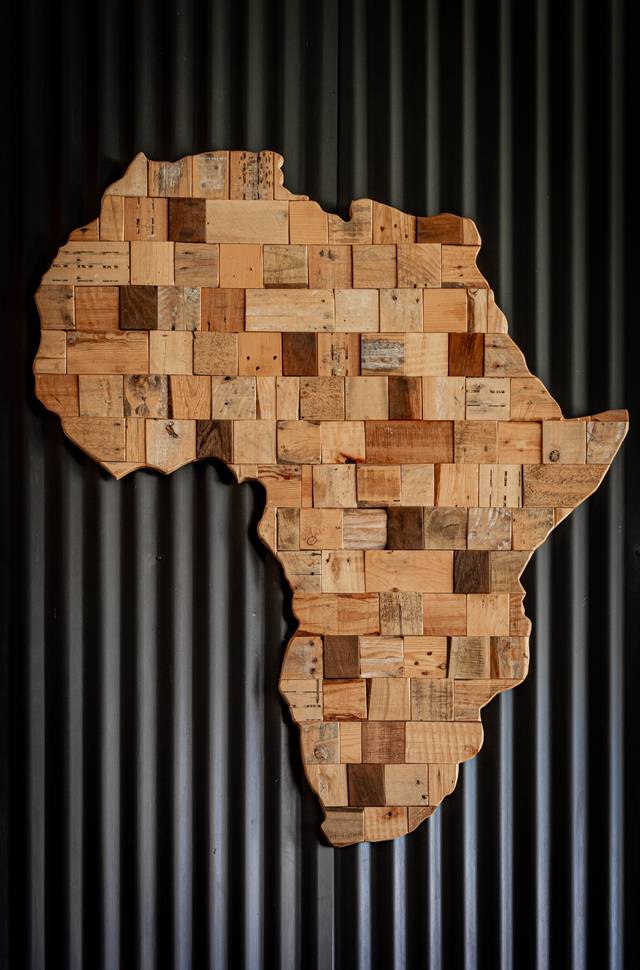
Young African Magazine
Trailblazing One Africa through the AfCFTA – From ideas to actions
“Ideas shape the course of history” – John Maynard Keyes (1883-1946). Through a brief analysis of the recently launched African Continental Free Trade Agreement, Aksay Lackoo (Mauritius & UCT, 2018) shares his perspectives on the imperatives for African business to act as locomotive towards “One Africa”
One of the linchpin initiatives under Africa’s framework for structural transformation, Agenda 2063, is the African Continental Free Trade Area (AfCFTA). Despite being in force since 30 May 2019, preferential trading under the new Agreement began on 1st January 2021 due to, inter alia, the COVID-19 pandemic.
From the ideas of Pan Africanism and African Renaissance to the African Union, Agenda 2063 lays the foundation towards the “inclusive growth” and “sustainable development” of Africa. The AfCFTA builds on decades-long ideas that the founding fathers, like Kwame Nkrumah, had for a unified Africa – economically and politically. The AfCFTA is designed to build on rather than to replace Africa’s existing eight regional economic communities (RECs) - ECCAS, ECOWAS, EAC, SADC, COMESA, AMU, CEN_SAD and IGAD (see Exhibit 1).
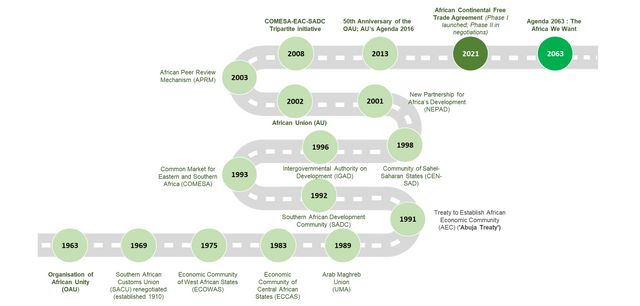
From the OAU to the AfCFTA, the continent has undergone series of events notwithstanding the recent COVID-19 pandemic, which caused a contraction of Africa’s GDP by 2.1 percent in 2020 as highlighted in the African Economic Outlook 2021. Through those years of vicissitudes, economic woes, such as unemployment and external indebtedness have haunted many African economies. Despite repetitive efforts for a paradigm shift, namely through regional trade, intra-African trade currently stands at 16%, which is relatively low globally, and particularly, when contrasted to Asia, which trades at 54% intra-regionally.
AfCFTA: Unfinished state of affairs
Considering the diverse needs and economic profiles of 55 African economies, the AfCFTA is an ambitious project (See Exhibit 2). While the Agreement and Phase I protocols were adopted in 2018, the process of securing the required signatures and ratifications for entry into force continued through 2019. To date, 36 countries - including the African hegemons – Kenya, Egypt, Nigeria and South Africa (the so-called KENSA group) - have deposited their instruments of ratifications. Only one country, Eritrea, is yet to sign the AfCFTA Agreement.
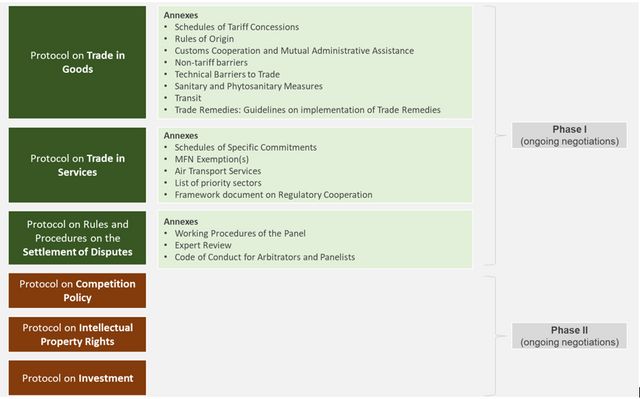
Though trading under the AfCFTA has begun on 1st January 2021, the launching was rather symbolical given that its incompleteness. Important features of the Agreement must still be negotiated and adopted. The applicable tariff schedules and rules of origin are outstanding. The rules for trade in services are also in negotiation. Phase II negotiations on competition, intellectual property rights and investment must also proceed. Moreover, a third phase will also be catered for the negotiation of an e-commerce protocol.
While the negotiations proceed, the objectives of the AfCFTA, on one hand, to progressively eliminate tariffs and non-tariff barriers to trade in goods and, on the other hand, to bolster cooperation on customs matters and trade facilitation are the bedrock to unlock commercial inflows and outflows between African economies.
African Business – the Integration Locomotive
Looking back to the ideas and initiatives since the OAU, the lesson for the AfCFTA is to devise strategic actions to the rhetoric of an “integrated continent”. Prioritising intra-African trade and improving regional and continental trade integration have been on the agenda of various African governments, economic actors and international institutions such as the UNCTAD and the World Bank.
Yet, in recent years, actions towards an integrated continent have gained momentum through a growing participation, directly and indirectly, of businesses seeking for growth avenues in the next frontier, which Africa represents. While even in recent years, coverage of the continent is often focused on political unrest, conflicts, poverty, drought – Africa is in fact doing just as well, if not better than, other developing regions of the world. In McKinsey-led book “Africa’s Business Revolution’, there is no dearth of success stories of entrepreneurs who are resolving problems and innovating to meet Africa’s unmet needs.
African business is the locomotive for the success of the AfCFTA. While the negotiations concretise towards a full-fledged Agreement, African business – small, medium or large, are the ultimate beneficiaries of this ambitious project (see Exhibit 3). With the progressive removal of tariffs and non-tariffs barriers on intra-African trade, businesses can situate industrial production in different countries across the continent, reaching an estimated target market of 600 million middle-class consumers. Moreover, in terms of aggregate GDP, this will range from $2.1 trillion to $3.4 trillion (or $6.7 trillion at Purchasing Power Parity terms). Aggregate private and B2B consumption is expected to constitute about $4 trillion.
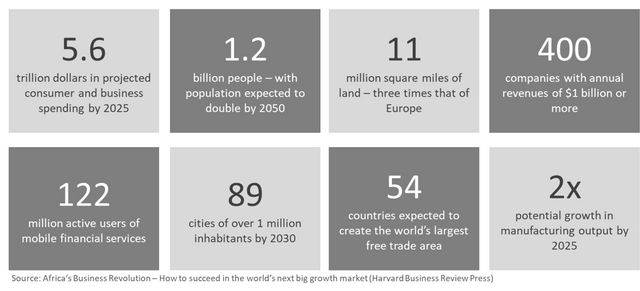
History shows us that African business, with ideas and purpose, have blazed a trail toward a more integrated Africa despite existing barriers and complications associated with geographic, economic and logistical fragmentation. BCG, in its report “Pioneering One Africa – The Companies Blazing a Trail across the Continent” provides concrete examples on how 150 companies are pioneering the African integration. Those companies, operating in various industries - financial, consumer and retail, industrial goods, technology and logistics - are engines for the African integration. They must be the first to jump on the AfCFTA bandwagon.
The opportunities are enormous – opportunities to scale, to access cheaper raw materials and intermediate inputs, to build regional value chains and enhance the potential for integration with global value chains, to catalyse the transformation of African economies and to benefit from intra-African and external direct capital flows.
Yet, putting purpose at the heart of Pan-African business is key for the continent to meet Agenda 2063 objectives. The AfCFTA presents a window of opportunities for inclusive and sustainable growth. Those opportunities range from diversifying exports, accelerating growth, competitively integrating into the global economy, increasing foreign direct investment, increasing employment and incomes and broadening economic inclusion.
Overcoming challenges to ripe benefits
Why Africa and its challenges? The African business community has been driving the continent’s industrial agenda, quite individualistically, for many years. While negotiations proceed, initiatives such as the Pan-African Private Sector, under the African Business Council and International Trade Centre’s ‘One Trade Africa’ programme are creating a conducive environment for the AfCFTA. It is time for the private sector to join hands with governments and communities in transforming Africa through infrastructure development, value-added manufacturing and innovation, amongst others. Governments can and must concert efforts to fully implement the AfCFTA, in the dire economic conditions caused by the COVID-19 pandemic, to “build back better” and cushion the effects of the pandemic. More so, while African business remains the ultimate beneficiaries, the whole continent stands to benefit from a fully and coherently implemented AfCFTA.
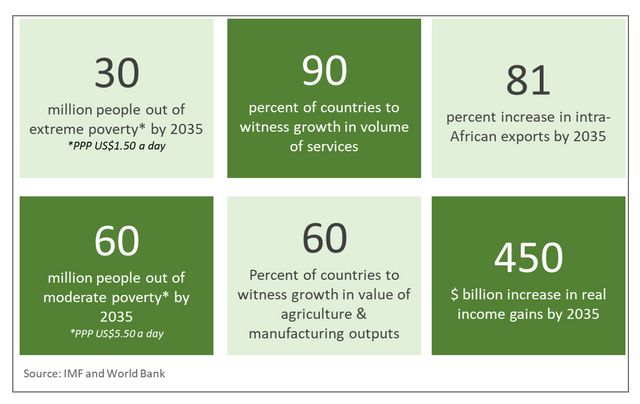
Recognising that the AfCFTA offers huge opportunities for socio-economic development in Africa, its implementation must be driven through an inclusive approach with governments, private sectors and communities. Indeed, lowering and eliminating tariffs is the relatively easy part, the hard part is around putting in place the nontariff and trade facilitation measures, investment in enabling infrastructures and most importantly, structural reforms to maximise AfCFTA benefits. The challenges and the opportunities seems, more than ever, bridged by the rhetoric and the concerted actions for ‘One Africa’. While ideas bring us the hope for a better future, actions will shape the course of Africa’s future.
Disclaimer: The views and opinions expressed in this article are those of the author and do not necessarily reflect the official views or position of the Mandela Rhodes Foundation or any affiliated institutions.







